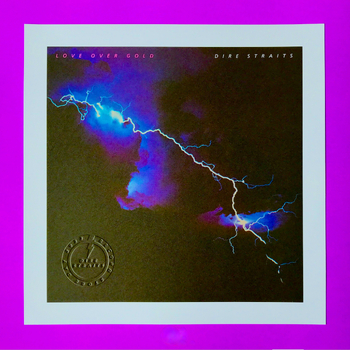LOVE OVER GOLD
Author: Bruce Jenkins Date Posted:28 October 2022

In 1982 I was deeply immersed in the Student Union of the tertiary institution where I’d just finished a degree. It was an exciting, intense time full of meetings, negotiations, and nights spent strategising how to improve the lot of the student population. We were young and relatively clueless, but deeply committed. Often by late afternoon a core group would adjourn to the pub across the road and repair to a dingy back room housing a beer-stained table and a wonky jukebox. We would take turns buying a jug or feeding the music machine. As the year wound down the most popular choice was a new single by Dire Straits: the moody, world-weary "Private Investigations". I’d like to think the noir vocalisations and mysterious jazzy arrangement showed how sophisticated our musical tastes were, but the real reason for the popularity of the song was its seven minute duration. We knew a bargain when we heard it.
The single’s success was not confined to Australia. "Private Investigations", despite sounding nothing like the synth-pop dominating charts at the time, made it to #2 in the UK.
"Private Investigations" came from the fourth Dire Straits album, Love Over Gold. Released in September 1982, it was without doubt the bands most atmospheric and exploratory work. Centrepiece of the LP is "Telegraph Road", the fourteen minute epic opening the album. The road in question is in Detroit, Michigan. Mark Knopfler recalled sitting at the front of the tour bus as it traversed this long truck route, musing about how the road and its scenery must have changed over the decades. He referenced a book he was reading at the time as well as an iconic cartoon by Robert Crumb entitled "A Short History Of America".
A fine example of the story-telling style that characterises Knopfler’s best songs, there are other layers to "Telegraph Road". The song alludes to industrialisation, the struggle of workers to make a living in good times and bad, and a yearning for escape that would be quite at home in a Bruce Springsteen song. It’s easy to imagine the songwriter making connections between development and decline in the USA and a parallel history in Newcastle, UK, the industrial city where he grew up. A highlight of this epic track is the liquid lightning of Knopfler’s guitar during the final instrumental section as the music builds to an inexorable and powerful climax.
Love Over Gold may have a downbeat ambience, but it is by no means a dour album. Side two kicks off with the droll satire of "Industrial Disease", another popular choice at our pub planning meetings. This rollicking rock song carries its biting lyric with ease and is a blood relation to the later "Money For Nothing". Alan Clark’s keyboard contribution to "Disease" adds much tonal interest.
The title track is a misty reflection balancing Clark’s piano with tasteful Knopfler guitar and some nice mallet work by guest Mike Mainieri. The album closes with another extended work, "It Never Rains". This track is most similar to earlier Dire Straits, although the extended arrangement and strong keyboard presence are aligned with the overall sound of the 1982 work.
Creating a wide cinematic musical canvas and allowing himself to stretch out with more complex arrangements, Mark Knopfler hit a creative highpoint with Love Over Gold. Soon after its release—but before embarking upon a huge world tour culminating in the live Alchemy album—he produced an excellent film soundtrack for the delightful Local Hero and contributed to albums by several other artists. Dire Straits also released the upbeat "Twisting By The Pool" E.P.
Love Over Gold, the first album Knopfler produced on his own, remains an engrossing and deeply satisfying listen. The sound is fabulous, especially on the 40th anniversary half-speed master version. So get some popcorn, put your feet up, and let Dire Straits take you on a trip. You’ll love it and when it’s over you’ll be convinced: it’s gold.
Bonus Factoid: During the Love Over Gold sessions, Knopfler also wrote "Private Dancer". The song was offered to Tina Turner, who used it to spearhead her 1984 comeback album.
© Bruce Jenkins—October 2022









